【新课标】Unit 2 Body language 第3课时Grammar 课件
文档属性
| 名称 | 【新课标】Unit 2 Body language 第3课时Grammar 课件 |

|
|
| 格式 | pptx | ||
| 文件大小 | 8.6MB | ||
| 资源类型 | 试卷 | ||
| 版本资源 | 牛津深圳版 | ||
| 科目 | 英语 | ||
| 更新时间 | 2023-02-10 00:00:00 | ||
图片预览

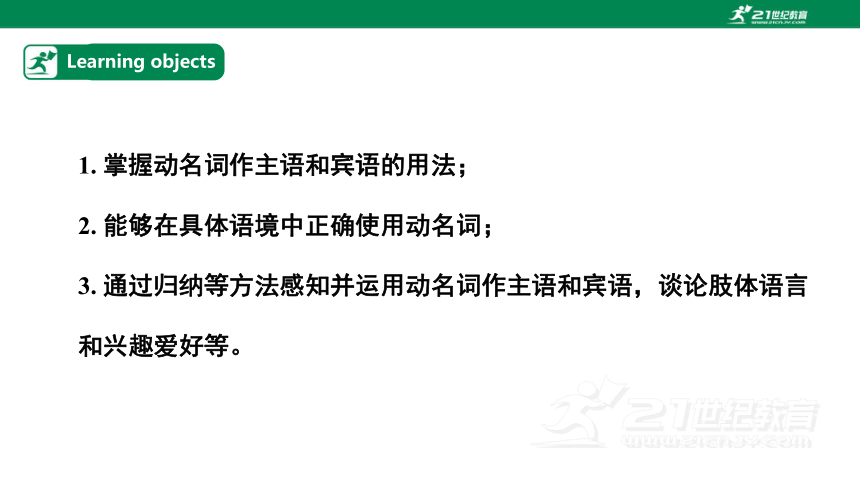
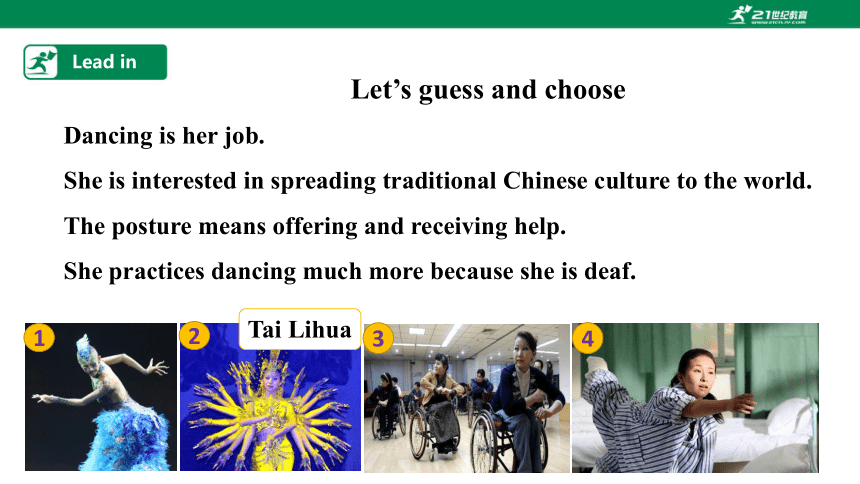

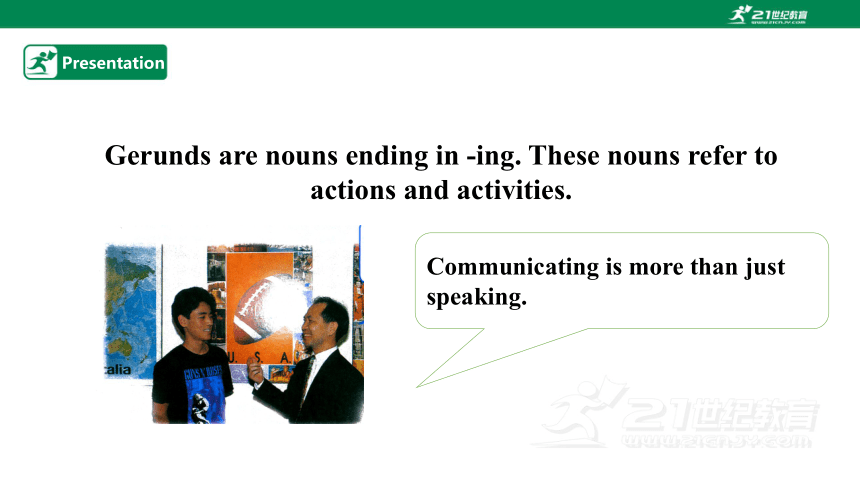
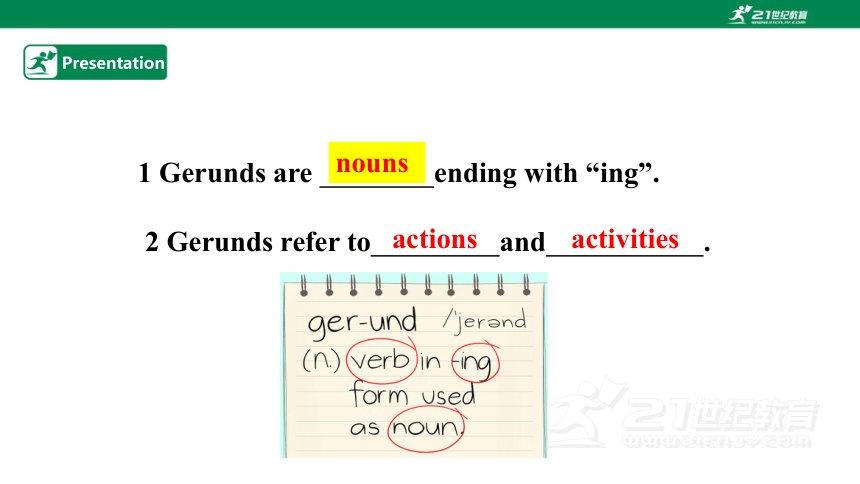
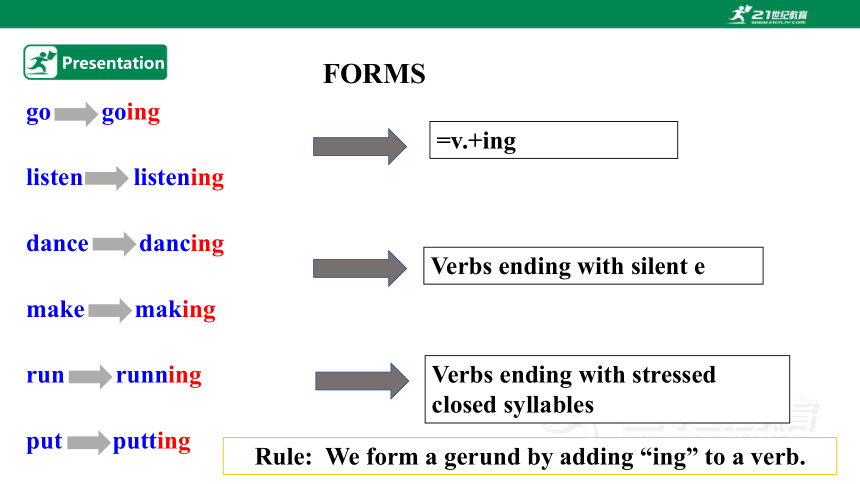




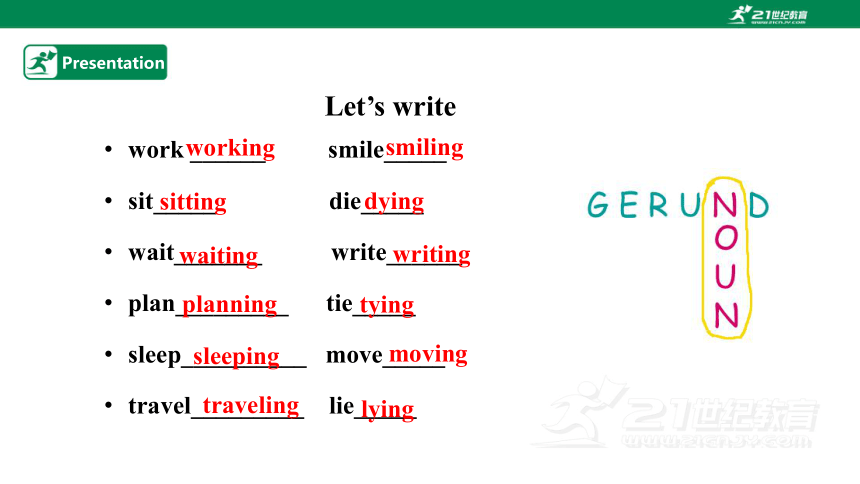
文档简介
(共48张PPT)
Unit 2 Body language
Period 3 Grammar
牛津深圳·广州版 八年级下
Learning objects
1. 掌握动名词作主语和宾语的用法;
2. 能够在具体语境中正确使用动名词;
3. 通过归纳等方法感知并运用动名词作主语和宾语,谈论肢体语言和兴趣爱好等。
Lead in
Let’s guess and choose
Tai Lihua
3
2
1
4
Dancing is her job.
She is interested in spreading traditional Chinese culture to the world.
The posture means offering and receiving help.
She practices dancing much more because she is deaf.
(1) Dancing is her job.
(2) She is interested in spreading traditional Chinese culture to the world.
(3) She practices dancing much more because she is deaf.
(4) The posture means offering and receiving help.
Read and pay attention to the parts in red.
Gerunds
(动名词)
Presentation
Communicating is more than just speaking.
Gerunds are nouns ending in -ing. These nouns refer to actions and activities.
Presentation
1 Gerunds are ending with “ing”.
2 Gerunds refer to and .
nouns
actions activities
Presentation
FORMS
go going
listen listening
dance dancing
make making
run running
put putting
=v.+ing
Verbs ending with silent e
Verbs ending with stressed closed syllables
Rule: We form a gerund by adding “ing” to a verb.
Presentation
holding
using
running
lying
Presentation
动名词的构成规则如下
(1)一般在动词原形后直接加ing .
(2)以不发音的字母e结尾的动词,
去掉e再加 ing
(3)以重读闭音节结尾,末尾只有一个辅音字母的动词, 双写最后一个字母再加ing
(4)少数以-ie结尾的动词,把ie变为y再加ing
Verb. Gerund begin beginning
communicate communicating
dance dancing
hold holding
sigh sighing
lie lying
We form gerunds from verbs.
Presentation
Things to remember
Gerunds are often uncountable. We do not add a or an before them.
A gerund can have its own object.
Debbie loves reading poems.
We usually form a gerund by adding ________ to a (verb/noun).
Work out the rule
ing
Presentation
1. V-ing: work-working
2. 以e结尾的去e+-ing: make-making
3. 以重读闭音节结尾的双写最后一个辅音字 母,再+-ing:
put-putting
4. 特例: lie-lying die-dying
动名词的构成
Presentation
work ______ smile_____
sit_____ die_____
wait_______ write______
plan_________ tie_____
sleep__________ move_____
travel_________ lie_____
working
smiling
sitting
dying
waiting
writing
planning
tying
sleeping
moving
traveling
lying
Presentation
Let’s write
1. 动名词是以-ing结尾的名词。这些名词描述动作和活动。
2. 动名词可作主语、宾语以及表语等句子成分。
3. 我们通常通过在动词后加-ing来构成动名词。
4. 动名词通常都是不可数的,不能在前面加a或an。
Reading is my hobby.
5. 动名词可以有它自己的宾语。
Debbie loves reading poems.
Presentation
Smiling shows that you are happy.
Ballet training usually starts at an early age.
Dancing is her favourite hobby.
A Gerunds as subjects
We can use a gerund as the subject of a sentence.
When we use a gerund as the subject of a sentence, the main verb is in (singular/plural) form.
Work out the rule
Presentation
▲ 动名词作主语时,谓语用单数。
Communicating is not just speaking.
交流不仅仅是说话。
▲ 两个或两个以上不同的动名词作主语,谓语用复数。
Playing computer games and playing basketball are my hobbies.
打游戏和打篮球是我的兴趣爱好。
Presentation
动名词作主语与不定式作主语的区别
动名词作主语通常表示抽象的或泛指的动作;
不定式作主语通常表示具体的动作或行为
___________with fire is dangerous. (泛指玩火)
_______with fire will be dangerous. (具体动作)
当表语是动名词时,主语也要用动名词;
当表语是不定式时,主语也要用不定式,如:
Seeing is ____________.
__________is to believe.
believing
To see
Playing
To play
Presentation
Look and say.
Using the “V+ing” structure.
Smiling means you are friendly and happy.
Crying means you are sad.
Smile
Cry
What does this facial expression mean
Presentation
S1: What can shaking your closed hand show
S2: Shaking your closed hand can show that you are angry.
shake your closed hand/angry
In pairs, ask and answer questions about the pictures. Follow the example.
Presentation
rest your head on your hand/bored
S1: What can resting your head on your hand show
S2: Resting your head on your hand can show that you’re bored.
Presentation
sigh/sad
S1: What can sighing show
S2: Sighing can show that you’re sad.
Presentation
close your eyes/thinking
S1: What can closing your eyes show
S2: Closing your eyes can show that you’re thinking.
Presentation
Debbie enjoys smiling and always looks friendly.
We often use gerunds after these verbs.
consider finish mind suggest
enjoy imagine practise
We can also use a gerund as the object of a sentence.
B Gerunds as objects
Things to remember
We often use gerunds after prepositions.
Debbie is good at communicating with people.
I am looking forward to going to Beijing.
Presentation
1. 英语中有一些动词(短语)后面常接动名词作宾语。如:
enjoy (like, love), suggest, mind, finish, practise, deny, avoid, admit, keep, miss
我不介意开门。
I don’t mind opening the door.
2.介词后要使用动名词。
他善于画画。
He is good at drawing pictures.
Presentation
enjoy 享受,喜爱
finish 完成
forgive 原谅
keep 保持,坚持
imagine 设想
miss 错过
mind 介意
permit 允许
admit 承认
advise 建议
allow 允许
avoid 避免
consider 考虑
dislike 不喜欢,讨厌
delay 延迟
deny 否认
英语中有一些动词后面常接动名词作宾语。
Presentation
risk 冒险
suggest 建议
practise 练习,实践
prevent 阻止
有些动词 (continue继续,prefer更喜欢,begin开始,hate讨厌,憎恨,like喜欢,start开始,love喜爱)后面既可以接不定式作宾语,也可以接动名词作宾语,意义差别不大。
通常认为用动名词泛指一般的倾向性,用不定式则表示特定或具体某一种动作。
Presentation
What do they enjoy
They enjoy drawing pictures.
They enjoy dancing.
Presentation
I enjoy playing chess.
I enjoy playing chess. I am fond of playing chess.
Remember: We use gerunds after prepositions (介词):
我喜欢学习汉语。
我们期待去野营。
I am fond of studying Chinese.
We look forward to going camping.
= I am fond of playing chess.
be good at be fond of be interested in keep on think of
be tired of look forward to be used to give up
Presentation
常见的“动词+介词+动名词”的短语有:
prefer... to, be used to, look forward to , feel like, give up, keep on, insist on, succeed in等。
你必须马上戒烟。
You must give up smoking at once.
他不想做家庭作业。
He doesn’t feel like doing his homework.
Presentation
某些惯用法:
(1) be busy doing sth “忙于做某事”
妈妈在厨房忙着做饭。
Mother is busy cooking dinner in the kitchen.
(2) be worth doing sth “值得做某事”
这本书值得一读。
The book is worth reading.
(3) It’s no use / good doing sth
“做……无用 / 无好处”
向他寻求帮助没有用。
It’s no use going to him for help.
Presentation
What is the boy/girl interested in
She is interested in singing.
He is interested in taking photos.
Look and say. Using the “V+ing”
Presentation
What is the boy/girl good at
She is good at studying.
He is good at swimming.
Look and say. Using the “V+ing”
Presentation
In pairs, ask and answer questions about the pictures.
Follow the example.
S1: What does the boy enjoy
S2: He enjoys reading books.
S1: What is the girl practising
S2: She is practising climbing mountains.
Presentation
S1: What is the girl interested in
S2: She is interested in playing chess.
S1: What is the girl good at
S2: She is good at skiing.
Presentation
动名词
1 动名词的基本形式:动词原形+ing;否定式:not +动词原形+ing。
2 动名词在句中的作用:
(1)作主语。如:眼见为实。
Seeing is believing.
注意:动名词作主语时,谓语动词用单数形式。
(2)作宾语。如:我很喜欢旅游。
I like travelling very much.
Summary
3 习惯接动名词作宾语的动词有:
enjoy, finish, imagine, keep, mind, practise等。如:
My sister enjoys playing tennis. 我姐姐喜欢打网球。
Do you mind opening the window 你介意开窗吗?
4 动名词也可以在短语动词和介词后作宾语,习惯接动名词作宾语的短语有:be afraid of, be busy, be good at, be interested in, be worth, feel like, how / what about, look forward to, pay attention to, succeed in, think of等。如:
Are you interested in playing chess 你对下象棋感兴趣吗?
I’m looking forward to visiting the Great Wall. 我盼望去参观长城。
Summary
接动词不定式或动名词均可且含义相同的动词有:
begin, start, like, love, hate, prefer, continue等。
接不定式多指具体的动作,接动名词多指一般或习惯行为。如:
He likes to sing / singing. 他喜欢唱歌。
It began to rain / raining. 开始下雨了。
6 以下动词接不定式和动名词意义大不相同:
stop to do something 停止手中事,去做另一件事
stop doing something 停止正在做的事
Summary
remember / forget / regret to do something
记得 / 忘记 / 遗憾要做某事(指动作尚未发生)
remember / forget / regret doing something
记得 / 忘记 / 遗憾做了某事(指动作已经发生)
try to do something 设法,努力去做,尽力
try doing something 试试去做,看有何结果
Summary
can’t help to do something 不能帮忙做
can’t help doing something 忍不住要做
go on to do something 接着做另外一件事
go on doing something 接着做同一件事
mean to do something 打算做,企图做
mean doing something 意思是,意味着
Summary
一、单项选择
1. Jack practises ______ the piano for two hours every day.
A. play B. playing C. to play D. played
2. I didn’t finish _______ my homework until 11∶30 p.m. last night.
A. doing B. to do C. do D. did
3. Do you enjoy _______ these children, Mr Smith
A. teach B. taught C. to teach D. teaching
B
A
D
Practice
4. I’m sorry I forgot ______ the dictionary to you.
A. returned B. returning C. to return D. return
5. I don’t mind ______ some housework at home.
A. to do B. doing C. did D. do
6. All the children are looking forward to ______ the new cartoon.
A. watch B. watching C. watched D. watches
C
B
B
Practice
7. --Would you like______ camping with me
--I’d like to. But I’m busy______ my homework.
A. to go; to do B. to go; doing
C. going; to do D. going; doing
B
8. While we were running on the playground, Jack suddenly stopped _______ and lay on the ground, so we all stopped______ what was wrong with him.
A. to run; to see B. running; seeing
C. running; to see D. ran; seeing
9. Sarah, you’d better drink more water after ___ for such a long time.
A. run B. runs C. to run D. running
C
D
_________(take) a walk for a while after meals is good for our health.
She spends her time watching TV instead of ________(study).
My father wasn’t happy, because I forgot ________(do) my homework.
In order to learn English well, you need to practice _______ (speak) English more and more.
Lily couldn’t stop _______(cry) when she heard the bad news.
Taking
studying
to do
speaking
crying
二、用单词的适当形式填空
Practice
8. When you leave the office, please do not forget ________(turn) off the lights.
9. Please remind me about ________(buy) a present for my mother.
10. When I was a child, I once dreamt of ________(receive) a letter from the queen in the UK.
11. My grandparents are used to _______(live) in the city now.
12. Do you mind my __________(smoke) here
to turn
buying
receiving
living
smoking
Practice
breathe do hear organize smoke take use walk
1 She is tired of ___________ the dirty air in the city centre.
She keeps on ________ to school instead of _________ a bus.
3 He finally gave up ________.
4 She is used to ________ a handkerchief instead of a tissue.
5 She was interested in ________ the puzzle.
6 She looks forward to ________ from her new e-friend.
7 She is good at __________ party activities.
breathing
walking
smoking
using
doing
hearing
organizing
taking
Practice
三、选词并用正确形式填空
Work in groups
List a student/teacher/famous person’s typical body language.
Ask the class to guess who she/he is.
Instroduce her/his hobby or habits.
Ask the class to take noes and report.
Production
Homework
Make a mind map about the gerunds you leant today (rules+examples).
2. Search for some information about a certain body
language/hobby in different cultures.
Reflection
如果语言是被赐予人类用来隐藏思想的话,
那么手势的目的是表露思想。
—约翰·奈皮尔(1550-1617)
苏格兰数学家、神学家,对数的发明者
If language was given to men to conceal their thoughts, then gesture's purpose was to disclose them.
—John Napier
谢谢
21世纪教育网(www.21cnjy.com)
中小学教育资源网站
兼职招聘:
https://www.21cnjy.com/recruitment/home/admin
Unit 2 Body language
Period 3 Grammar
牛津深圳·广州版 八年级下
Learning objects
1. 掌握动名词作主语和宾语的用法;
2. 能够在具体语境中正确使用动名词;
3. 通过归纳等方法感知并运用动名词作主语和宾语,谈论肢体语言和兴趣爱好等。
Lead in
Let’s guess and choose
Tai Lihua
3
2
1
4
Dancing is her job.
She is interested in spreading traditional Chinese culture to the world.
The posture means offering and receiving help.
She practices dancing much more because she is deaf.
(1) Dancing is her job.
(2) She is interested in spreading traditional Chinese culture to the world.
(3) She practices dancing much more because she is deaf.
(4) The posture means offering and receiving help.
Read and pay attention to the parts in red.
Gerunds
(动名词)
Presentation
Communicating is more than just speaking.
Gerunds are nouns ending in -ing. These nouns refer to actions and activities.
Presentation
1 Gerunds are ending with “ing”.
2 Gerunds refer to and .
nouns
actions activities
Presentation
FORMS
go going
listen listening
dance dancing
make making
run running
put putting
=v.+ing
Verbs ending with silent e
Verbs ending with stressed closed syllables
Rule: We form a gerund by adding “ing” to a verb.
Presentation
holding
using
running
lying
Presentation
动名词的构成规则如下
(1)一般在动词原形后直接加ing .
(2)以不发音的字母e结尾的动词,
去掉e再加 ing
(3)以重读闭音节结尾,末尾只有一个辅音字母的动词, 双写最后一个字母再加ing
(4)少数以-ie结尾的动词,把ie变为y再加ing
Verb. Gerund begin beginning
communicate communicating
dance dancing
hold holding
sigh sighing
lie lying
We form gerunds from verbs.
Presentation
Things to remember
Gerunds are often uncountable. We do not add a or an before them.
A gerund can have its own object.
Debbie loves reading poems.
We usually form a gerund by adding ________ to a (verb/noun).
Work out the rule
ing
Presentation
1. V-ing: work-working
2. 以e结尾的去e+-ing: make-making
3. 以重读闭音节结尾的双写最后一个辅音字 母,再+-ing:
put-putting
4. 特例: lie-lying die-dying
动名词的构成
Presentation
work ______ smile_____
sit_____ die_____
wait_______ write______
plan_________ tie_____
sleep__________ move_____
travel_________ lie_____
working
smiling
sitting
dying
waiting
writing
planning
tying
sleeping
moving
traveling
lying
Presentation
Let’s write
1. 动名词是以-ing结尾的名词。这些名词描述动作和活动。
2. 动名词可作主语、宾语以及表语等句子成分。
3. 我们通常通过在动词后加-ing来构成动名词。
4. 动名词通常都是不可数的,不能在前面加a或an。
Reading is my hobby.
5. 动名词可以有它自己的宾语。
Debbie loves reading poems.
Presentation
Smiling shows that you are happy.
Ballet training usually starts at an early age.
Dancing is her favourite hobby.
A Gerunds as subjects
We can use a gerund as the subject of a sentence.
When we use a gerund as the subject of a sentence, the main verb is in (singular/plural) form.
Work out the rule
Presentation
▲ 动名词作主语时,谓语用单数。
Communicating is not just speaking.
交流不仅仅是说话。
▲ 两个或两个以上不同的动名词作主语,谓语用复数。
Playing computer games and playing basketball are my hobbies.
打游戏和打篮球是我的兴趣爱好。
Presentation
动名词作主语与不定式作主语的区别
动名词作主语通常表示抽象的或泛指的动作;
不定式作主语通常表示具体的动作或行为
___________with fire is dangerous. (泛指玩火)
_______with fire will be dangerous. (具体动作)
当表语是动名词时,主语也要用动名词;
当表语是不定式时,主语也要用不定式,如:
Seeing is ____________.
__________is to believe.
believing
To see
Playing
To play
Presentation
Look and say.
Using the “V+ing” structure.
Smiling means you are friendly and happy.
Crying means you are sad.
Smile
Cry
What does this facial expression mean
Presentation
S1: What can shaking your closed hand show
S2: Shaking your closed hand can show that you are angry.
shake your closed hand/angry
In pairs, ask and answer questions about the pictures. Follow the example.
Presentation
rest your head on your hand/bored
S1: What can resting your head on your hand show
S2: Resting your head on your hand can show that you’re bored.
Presentation
sigh/sad
S1: What can sighing show
S2: Sighing can show that you’re sad.
Presentation
close your eyes/thinking
S1: What can closing your eyes show
S2: Closing your eyes can show that you’re thinking.
Presentation
Debbie enjoys smiling and always looks friendly.
We often use gerunds after these verbs.
consider finish mind suggest
enjoy imagine practise
We can also use a gerund as the object of a sentence.
B Gerunds as objects
Things to remember
We often use gerunds after prepositions.
Debbie is good at communicating with people.
I am looking forward to going to Beijing.
Presentation
1. 英语中有一些动词(短语)后面常接动名词作宾语。如:
enjoy (like, love), suggest, mind, finish, practise, deny, avoid, admit, keep, miss
我不介意开门。
I don’t mind opening the door.
2.介词后要使用动名词。
他善于画画。
He is good at drawing pictures.
Presentation
enjoy 享受,喜爱
finish 完成
forgive 原谅
keep 保持,坚持
imagine 设想
miss 错过
mind 介意
permit 允许
admit 承认
advise 建议
allow 允许
avoid 避免
consider 考虑
dislike 不喜欢,讨厌
delay 延迟
deny 否认
英语中有一些动词后面常接动名词作宾语。
Presentation
risk 冒险
suggest 建议
practise 练习,实践
prevent 阻止
有些动词 (continue继续,prefer更喜欢,begin开始,hate讨厌,憎恨,like喜欢,start开始,love喜爱)后面既可以接不定式作宾语,也可以接动名词作宾语,意义差别不大。
通常认为用动名词泛指一般的倾向性,用不定式则表示特定或具体某一种动作。
Presentation
What do they enjoy
They enjoy drawing pictures.
They enjoy dancing.
Presentation
I enjoy playing chess.
I enjoy playing chess. I am fond of playing chess.
Remember: We use gerunds after prepositions (介词):
我喜欢学习汉语。
我们期待去野营。
I am fond of studying Chinese.
We look forward to going camping.
= I am fond of playing chess.
be good at be fond of be interested in keep on think of
be tired of look forward to be used to give up
Presentation
常见的“动词+介词+动名词”的短语有:
prefer... to, be used to, look forward to , feel like, give up, keep on, insist on, succeed in等。
你必须马上戒烟。
You must give up smoking at once.
他不想做家庭作业。
He doesn’t feel like doing his homework.
Presentation
某些惯用法:
(1) be busy doing sth “忙于做某事”
妈妈在厨房忙着做饭。
Mother is busy cooking dinner in the kitchen.
(2) be worth doing sth “值得做某事”
这本书值得一读。
The book is worth reading.
(3) It’s no use / good doing sth
“做……无用 / 无好处”
向他寻求帮助没有用。
It’s no use going to him for help.
Presentation
What is the boy/girl interested in
She is interested in singing.
He is interested in taking photos.
Look and say. Using the “V+ing”
Presentation
What is the boy/girl good at
She is good at studying.
He is good at swimming.
Look and say. Using the “V+ing”
Presentation
In pairs, ask and answer questions about the pictures.
Follow the example.
S1: What does the boy enjoy
S2: He enjoys reading books.
S1: What is the girl practising
S2: She is practising climbing mountains.
Presentation
S1: What is the girl interested in
S2: She is interested in playing chess.
S1: What is the girl good at
S2: She is good at skiing.
Presentation
动名词
1 动名词的基本形式:动词原形+ing;否定式:not +动词原形+ing。
2 动名词在句中的作用:
(1)作主语。如:眼见为实。
Seeing is believing.
注意:动名词作主语时,谓语动词用单数形式。
(2)作宾语。如:我很喜欢旅游。
I like travelling very much.
Summary
3 习惯接动名词作宾语的动词有:
enjoy, finish, imagine, keep, mind, practise等。如:
My sister enjoys playing tennis. 我姐姐喜欢打网球。
Do you mind opening the window 你介意开窗吗?
4 动名词也可以在短语动词和介词后作宾语,习惯接动名词作宾语的短语有:be afraid of, be busy, be good at, be interested in, be worth, feel like, how / what about, look forward to, pay attention to, succeed in, think of等。如:
Are you interested in playing chess 你对下象棋感兴趣吗?
I’m looking forward to visiting the Great Wall. 我盼望去参观长城。
Summary
接动词不定式或动名词均可且含义相同的动词有:
begin, start, like, love, hate, prefer, continue等。
接不定式多指具体的动作,接动名词多指一般或习惯行为。如:
He likes to sing / singing. 他喜欢唱歌。
It began to rain / raining. 开始下雨了。
6 以下动词接不定式和动名词意义大不相同:
stop to do something 停止手中事,去做另一件事
stop doing something 停止正在做的事
Summary
remember / forget / regret to do something
记得 / 忘记 / 遗憾要做某事(指动作尚未发生)
remember / forget / regret doing something
记得 / 忘记 / 遗憾做了某事(指动作已经发生)
try to do something 设法,努力去做,尽力
try doing something 试试去做,看有何结果
Summary
can’t help to do something 不能帮忙做
can’t help doing something 忍不住要做
go on to do something 接着做另外一件事
go on doing something 接着做同一件事
mean to do something 打算做,企图做
mean doing something 意思是,意味着
Summary
一、单项选择
1. Jack practises ______ the piano for two hours every day.
A. play B. playing C. to play D. played
2. I didn’t finish _______ my homework until 11∶30 p.m. last night.
A. doing B. to do C. do D. did
3. Do you enjoy _______ these children, Mr Smith
A. teach B. taught C. to teach D. teaching
B
A
D
Practice
4. I’m sorry I forgot ______ the dictionary to you.
A. returned B. returning C. to return D. return
5. I don’t mind ______ some housework at home.
A. to do B. doing C. did D. do
6. All the children are looking forward to ______ the new cartoon.
A. watch B. watching C. watched D. watches
C
B
B
Practice
7. --Would you like______ camping with me
--I’d like to. But I’m busy______ my homework.
A. to go; to do B. to go; doing
C. going; to do D. going; doing
B
8. While we were running on the playground, Jack suddenly stopped _______ and lay on the ground, so we all stopped______ what was wrong with him.
A. to run; to see B. running; seeing
C. running; to see D. ran; seeing
9. Sarah, you’d better drink more water after ___ for such a long time.
A. run B. runs C. to run D. running
C
D
_________(take) a walk for a while after meals is good for our health.
She spends her time watching TV instead of ________(study).
My father wasn’t happy, because I forgot ________(do) my homework.
In order to learn English well, you need to practice _______ (speak) English more and more.
Lily couldn’t stop _______(cry) when she heard the bad news.
Taking
studying
to do
speaking
crying
二、用单词的适当形式填空
Practice
8. When you leave the office, please do not forget ________(turn) off the lights.
9. Please remind me about ________(buy) a present for my mother.
10. When I was a child, I once dreamt of ________(receive) a letter from the queen in the UK.
11. My grandparents are used to _______(live) in the city now.
12. Do you mind my __________(smoke) here
to turn
buying
receiving
living
smoking
Practice
breathe do hear organize smoke take use walk
1 She is tired of ___________ the dirty air in the city centre.
She keeps on ________ to school instead of _________ a bus.
3 He finally gave up ________.
4 She is used to ________ a handkerchief instead of a tissue.
5 She was interested in ________ the puzzle.
6 She looks forward to ________ from her new e-friend.
7 She is good at __________ party activities.
breathing
walking
smoking
using
doing
hearing
organizing
taking
Practice
三、选词并用正确形式填空
Work in groups
List a student/teacher/famous person’s typical body language.
Ask the class to guess who she/he is.
Instroduce her/his hobby or habits.
Ask the class to take noes and report.
Production
Homework
Make a mind map about the gerunds you leant today (rules+examples).
2. Search for some information about a certain body
language/hobby in different cultures.
Reflection
如果语言是被赐予人类用来隐藏思想的话,
那么手势的目的是表露思想。
—约翰·奈皮尔(1550-1617)
苏格兰数学家、神学家,对数的发明者
If language was given to men to conceal their thoughts, then gesture's purpose was to disclose them.
—John Napier
谢谢
21世纪教育网(www.21cnjy.com)
中小学教育资源网站
兼职招聘:
https://www.21cnjy.com/recruitment/home/admin
同课章节目录
